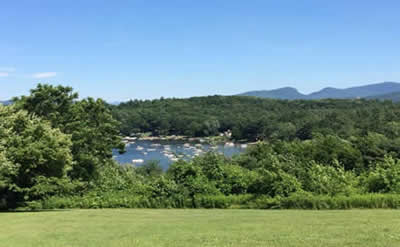 Under Section 401(a)(1) of the Clean Water Act (33 USC § 1341), states have the authority to review and approve, condition, waive, or deny water quality certification for any activity that is subject to a Federal permit or license and may result in a discharge to waters of the United States.
Under Section 401(a)(1) of the Clean Water Act (33 USC § 1341), states have the authority to review and approve, condition, waive, or deny water quality certification for any activity that is subject to a Federal permit or license and may result in a discharge to waters of the United States.
In Vermont, Section 401 Water Quality Certification (WQC) applications are reviewed to determine if the proposed activity will comply with the Vermont Water Quality Standards and other requirements of State law. Section 401 authority applies, for example, to projects requiring a permit from the U.S. Army Corps of Engineers (USACE) or a hydropower license from the Federal Energy Regulatory Commission (FERC).
For information regarding Section 401 Water Quality Certifications for activities requiring a permit from USACE, contact: ANR.WSMD401@vermont.gov; 802-490-6131
For information regarding Section 401 Water Quality Certifications for activities requiring a license from FERC, contact: Jeff Crocker; 802-490-6151
Examples of Federal permits / licenses that may require Section 401 Water Quality Certification:
- A permit from the USACE pursuant to §9 or §10 of the Rivers and Harbors Act for work or structures in or affecting navigable waters.
- A permit from the USACE pursuant to §404 of the Clean Water Act (CWA) Pollutant for the placement of fill or discharge of dredged materials into waters of the Unite d States.
- FERC hydropower license. FERC does not require a §401 certification before acting on a FERC exemption application, the Secretary deems certification necessary to fulfill the Secretary's obligations in the FERC process as a fish and wildlife resource agency.
- A discharge permit issued by the U.S. Environmental Protection Agency (EPA) pursuant to §402 of the CWA and the National Pollutant Discharge and Elimination System (NPDES) program for a point source discharge of pollutant(s) into waters of the United States (visit the Vermont Stormwater Program page for information regarding NPDES permit programs).
- A license issued by the Nuclear Regulatory Commission (NRC).
- Any other federal license or permit to conduct any activity, including, but not limited to, the construction or operation of facilities, which may result in any discharge into waters of the United States.
Application Process:
Below is an overview of the typical practice for processing WQC applications.
- At least 30 days prior to submitting a certification request, the applicant must request a pre-filing meeting by completing and submitting a Water Quality Certification Pre-Application.
- At the pre-filing meeting, the applicant may review the pre-application submitted, including proposed activities and anticipated water quality impacts; the timeline for permitting, construction, and operation; and other required state and federal permits.
- The Agency may decide, based upon the information contained in the pre-application, to waive the Section 401 Water Quality Certification. Unless a waiver is granted, the applicant must request a Section 401 Water Quality Certification by completing and submitting the Water Quality Certification Application.
- Applicants are encouraged to apply for all surface-water related permits or approvals prior to applying for a Water Quality Certification.
- Upon receipt of the application, an initial review to determine administrative completeness will occur. A WQC application is administratively complete if it includes all initially required documentation necessary to conduct a technical review.
- The 401 Water Quality Certification will be noticed pursuant to Vermont Water Quality Standards § 29A-206(e). The applicant shall provide notice of their § 401 Water Quality Certification application to any person or adjoining property owner that receives notice of the federal license or permit application for which the § 401 Water Quality Certification is sought.
- Public comments will be considered and a response to comments provided when a final decision is made.
Related Watershed Management Programs:
- If your project alters stream flow, for example, a hydroelectric power, flood control, or water withdrawal project, visit the Streamflow Protection page of the Rivers Program for more information.
- If there are any wetlands associated with your project, visit the Wetlands Program page for more information.
- If your project will require management of stormwater runoff, visit the Stormwater Program page for more information.
- If there are any rivers or streams associated with your project, visit the Rivers Program page for more information.
- If your project requires any lake encroachment or shoreland development, visit the Lakes & Ponds Program page for more information.
